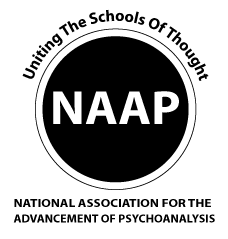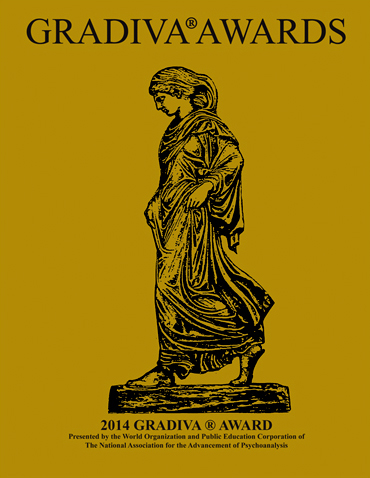Each year, NAAP acknowledges the literary and artistic achievements of those who have created works that represent and promote psychoanalysis and psychotherapy. Publishers enjoy the recognition of their authors, foundations of their artists, and production companies of their directors. As one publisher commented upon hearing that several of her authors had received nominations, “I was so glad to see that our hard work over the past year paid off. You don’t always get such recognition.”
CATEGORIES
- ART
- ARTICLE
- BOOK
- BOOK (edited volume)
- DOCUMENTARY/TV PROGRAM/MOVIE
- DIGITAL MEDIA (blog or podcast)
- PLAY or POETRY
- STUDENT PAPER (unpublished or published)
RULES: We invite submissions from members and non-members for the best published, produced, or publicly exhibited works that promote psychoanalysis or psychotherapy. All entries must have been produced between January 1, 2023 and April 30, 2024, and must have a psychoanalytic or mental health theme.
The deadline for submissions is Wednesday, July 31, 2024.
Art: Art submissions must be either a series that has been exhibited or an exhibit as a whole. Submissions will only be accepted in a JPEG or PDF format. Please also include a weblink to the exhibition.
Articles: Papers must be submitted as hard copies to each of the judges. The NAAP office will accept a PDF of the publication.
Books may be submitted in hardcover or paperback format.
Digital Media/Documentaries/Movies: All entries in these categories must provide a weblink and password (if required). Newsletters will not be accepted.
Plays: send a script, and/or performance date(s) and a weblink to the performance.
Student papers should be submitted as an MS Word or PDF file. Please note, student papers must be of journal article length; we cannot accept dissertations or final presentations.
The Gradiva Award judges are selected from qualified applicants/volunteers from the various schools of thought represented by NAAP. Nominees will be announced at the end of November. The winners will be announced at the end of December. The judges’ decisions are final and the committee reserves the right not to bestow an award in any given category.
To nominate: Please complete a 2024 Gradiva submission sheet and e-mail it to naap@naap.org only. In addition, please mail a physical copy of your submission to each of the following judges below:
- Nunzio Gubitosa, MPhil, MA, Chair, 711 West End Ave.,#4D-S, New York, NY 10025, gubfam7@aol.com
- Martin Gliserman, PhD, PsyA, 120 Lawrence Ave., Highland Park, NJ 08904-1849, gliserma@english.rutgers.edu
- Ronald O. Lieber, MFA, LP, NCPsyA, 1103 Lakeview Rd, Copake, NY 12516
ronaldlieber@gmail.com - Patricia Llosa, MFA, 39 Claremont Ave., #41, New York, NY 10027, Llosa.patricia@gmail.com
- NAAP, 850 Seventh Ave., Suite 800, New York, NY 10019, naap@naap.org
For questions about the nominations process and awards, contact
Emily Horvath at NAAP naap@naap.org
or Nunzio Gubitosa, MPhil, MA, Chair, gubfam7@aol.com
Please click here to download a pdf with the 2024 Gradiva information.
Click here for last year’s award winners.
Interest in becoming a Gradiva committee member? Click here for more information>>
ABOUT THE GRADIVA® AWARDS
The awards were inspired by Freud’s essay “Delusions and Dreams in Jensen’s Gradiva” (1907(1905)), in which he stated:
“Creative writers are valuable allies and their evidence is to be prized highly, for they are apt to know a whole host of things between heaven and earth of which our philosophy has not yet let us dream … they draw upon sources which we have not yet opened up for science.”
In 1994, Robert Quackenbush proposed these awards for the best published, produced, or publicly exhibited works that advance psychoanalysis. Recalling Freud’s words, NAAP established the Gradiva® Awards to honor our “valuable allies,” including writers, artists, producers, directors, publishers, and others. The winners of the first Gradiva® Awards were announced at the 1995 annual NAAP conference, and included a revival of Moss Hart’s play “Lady in the Dark,” with Kitty Carlisle Hart accepting the award on behalf of her late husband, and Judith E. Daykin accepting an award as Executive Director for the play produced by Encores!
Quackenbush designed and rendered in woodcut the symbol for the awards (now a registered trademark for NAAP) and this was in turn etched on brass plates then mounted on wood. Quackenbush based his rendering on a wall plaque that hung in Freud’s office––a plaster copy of an ancient Roman, marble bas-relief that is displayed in the Vatican Museum.
The sculpture represents a young woman, attired in clothing of the period, stepping along in a charming gait. The image inspired a short novel by Wilhelm Jensen titled Gradiva, a version of Shaw’s Pygmalion, in which a young man falls in love with the image of the girl on the bas-relief and names her Gradiva. He dreams that she lived in Pompeii during the eruption of Vesuvius and he wants to save her. After, while exploring ruins in Italy, he sees in real life the Gradiva of his dreams walking among the columns.
“I could identify with Freud’s words,” says Quackenbush. “I know about the power of being in touch with my unconscious as a professional artist, writer, and psychoanalyst. That was my motivation for wanting to establish the Gradiva® Awards at NAAP: to call forth recognition and appreciation of artists, writers, musicians, poets, filmmakers, and publishers who have made significant contributions to the psychoanalytic community.”
While fear may remain in the minds of those who shun psychoanalysis for what they think might kill their art, the Gradiva® Awards confirm that exploration of the unconscious may do just the opposite, making psychoanalysis a fertile ground for ideas and new works.
It is a great testament to the awards that their creator has authored and illustrated over 200 books for children, in addition to writing numerous articles for psychoanalytic journals and trade publications about childhood behavior and children’s education. For establishing the Gradiva®Awards, Robert Quackenbush received the Vision Award in 2004.

